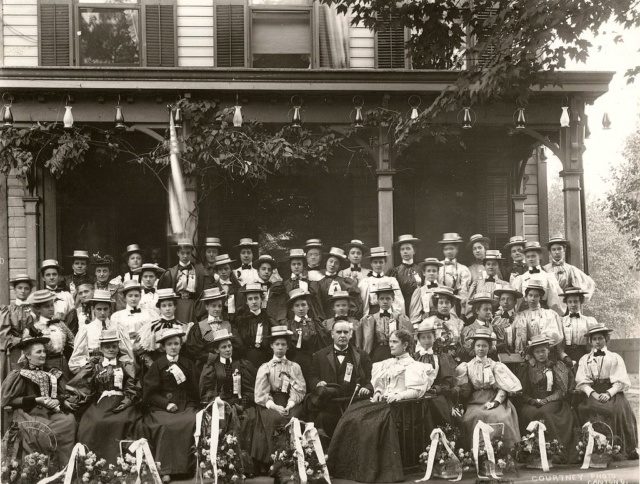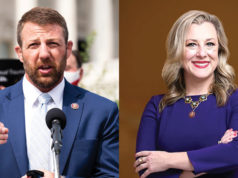
LONDON — Feeling in the depths of despair and angst one day toward the end of last November, a desperate internet search for “one-term American presidencies” sucked me firmly down the Wikipedia rabbit hole of American political history.
It was there, with a good portion of my productive afternoon gone, that I stumbled across a photo (see above) of former President William and First Lady Ida McKinley with the Flower Delegation of Oil City, Pennsylvania. The delegation posed on McKinley’s front porch in Canton, Ohio, where he hosted a series of visits known as his “front porch campaign” during the 1896 election season.
The photograph with McKinley is significant given that a presidential candidate saw the importance of their work and their small but influential voice in a key populace.
But what struck me as interesting about this group of women, who were working on one segment of the women’s suffrage movement, was the oddly empty space in history reserved for them. I was shockingly ignorant to them until very recently.
Little has been preserved about these women’s stories as well, aside from a brief New York Times article lauding Pennsylvania for sending its “best looking girls” to meet with the future president.
At a time when the majority of American women did not yet have the basic and fundamental right to reach for the ballot box, the Flower Delegation quietly wielded their influence through their husbands, brothers, fathers and uncles who could, advocating for policies and politicians that promised more equal treatment. It would be some 24 years before the passing of the 19th Amendment gave all women the right to vote.
The work of these women, and all those who fought to ensure an equal voice, is powerful and should be remembered as we stand at another precipice in history.
Rights in peril
We face the inauguration of a new leadership that seeks to put women’s rights and issues on the chopping block. With the incoming administration, many things are in peril: Planned Parenthood funding and preventative education for women, health care coverage, equality and equal pay for all genders in the workplace, paid family leave and child care provisions and acknowledgement and protection from sexual harassment and discrimination.
With the majority of Congress, state governments and legislatures all within the control of a single party, the Supreme Court ripe for manipulating and the remaining checks and balances of a Senate filibuster laid vulnerable, we are facing an unprecedented situation of hegemonic power that is simply not normal.
This is scary and threatens those of us who view women’s issues less as partisan positions and more as basic human rights that transcend politics. We feel it necessary to reaffirm the cause of a faithful few taken up more than a century ago: our right to be heard.
Don’t get down, get up
That day in November, when I (and probably many of us) did not feel like getting out of bed, when we were all poised to cruise on autopilot through the next four or even eight years but found ourselves suddenly in the throes of turbulence at the hands of grossly unskilled pilots, we were forced not only to wake up but — more importantly — to get up.
Like the cause of America’s earliest suffragettes, this crusade will be difficult. Raising our voices in a Trump administration will be uncomfortable, awkward and even painful, but we know the voices of opposition will only grow louder and more divisive as the months and years go on. We will have to amplify our own to grow more thunderous over a competing crescendo that is designed to drown out and distract.
Actions to be taken
The Saturday after the inauguration, women and men from across America and all over the world will get out of bed, lace up our shoes and hit the streets in the same spirit of diversity, equality, inclusion and democracy that led the generations before us to stand up and speak out.
Yet crucially, the most important work only starts from there, because we recognize that the job is far from over. We will keep our veritable boots on beyond Saturday.
For many of us, that means calling congressmen and women in our districts to express our concerns and hold them accountable. For others, that means renewing our own personal passions to build stronger communities for ourselves and our most vulnerable. For others still, we will knock on doors and sign up for volunteer slots.
We will discover the small but vibrant organizations around us that need our support the most. We will learn not just to reach across the political aisle but to cross our own streets to talk to neighbors and even strangers. We will offer up greater support to the immense responsibility of a free and fair press to remind us all of the truths that are becoming increasingly less self evident. Some of us will even answer the call to take up offices of our own to have an even greater stake in the formation of our democracy.
Create a more equitable future
In whatever way, in as much capacity as we have, we will find a place to plug in, and we will learn once again and after all that, when it comes to change, we were always the ones we had been waiting for. From the Flower Delegation to the 19th Amendment to the ordinary women working to do extraordinary things today, it has always been on us to create a more equitable future.
The 2020 general election season will coincide with the 100th anniversary of women’s right to vote in the United States, and history has shown us that women who speak up for economic interests and social solidarities via channels of protest do so in interconnected ways to the concerns of their male counterparts.
Basically, what is good for women benefits all.
The coming years will be challenging, but we may yet reach that plateau and be able to look back and marvel at how incredibly far we’ve come.





















